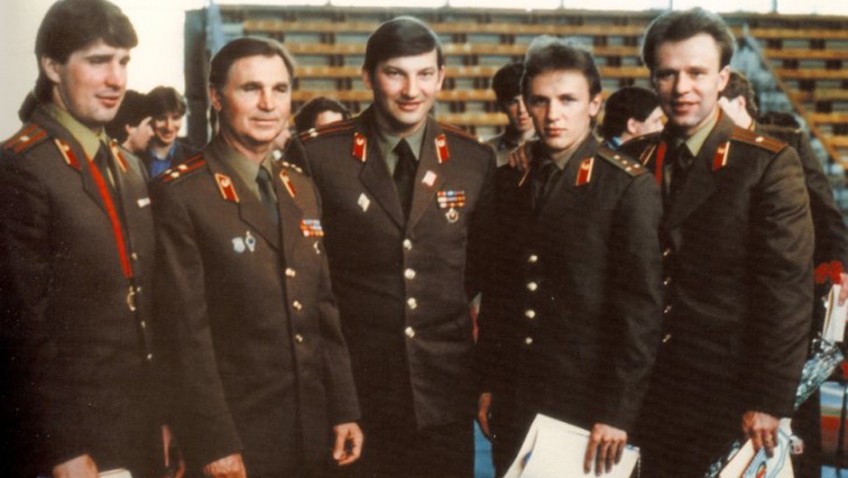Joyce Glasser reviews Red Army
Who would have thought that a documentary about the world’s most successful ice hockey team and Cold War sports in the former Soviet Union could be not only absorbing, but also exhilarating, moving and funny?
In Gabe Polsky’s Red Army the weapons are ice hockey sticks and the unique training the young players received that enabled them to literally skate circles around their opponents. But it is the personal journey of the film’s narrator, Red Army Captain Viachaslav Fetisov, that makes this world come to life for a fascinating 84 minutes.
The film opens on a close up of Viachaslav (Slava) Fetisov, now 57, staring at his mobile phone as a list of his medals (including several Junior Championships two Olympic Golds, one Olympic Silver and three Bronzes, and one Canada Cup) scrolls down the screen.
Fetisov exhibits a dead pan humour as he tells the director, ‘I’m busy now,’ delaying the start of the interview while he reads his message. It’s not until the end of the film that we learn who might have sent it.
For this absorbing story about how the Soviet Union fought the cold war through sports, is very much the story of Fetisov’s life. He was brought up in terrible post-war conditions, but was happy as he loved sports and his parents encouraged him.
This passion coincided with the Soviet Union’s drive to prove its way of life was superior to that of the west through sports competition. At age ten Slava’s life’s direction was set when he was accepted to the USSR’s ice hockey program designed by the maverick, hugely influential ‘father of Soviet ice hockey’, Anatoli Tarasova (1918-1995).
Fetisov tells us, ‘This man played a big role in my life; his books were next to my bed’ and it was to the then-reclusive Tarasova Fetisov returned for training when he quit the team and was blacklisted in his country. Because Tarasova believed the key to the game was in passing (the trainees were made to do multiple somersaults on the ice without dropping their sticks and exhausting lunges), he put teamwork at the core of his program.
The film includes biographical sketches of Fetisov’s four team mates who went on to win Olympic Gold medals at the 1984 and 1988 Winter Olympics. Fetisov was devastated when Tarasova was fired (for professional misconduct) in 1972 and replaced by Viktor Tikhonov (how died last year). Tikhonov was the coach when of the Soviet Team that lost to the USA in the famous 1980 ‘Miracle on Ice’ game, but went on to redeem himself with several Olympic wins. Still, Fetisov observes, ‘he was unliked.’
The Soviet fixation on teamwork corresponded to the Communist philosophy of suppression of the individual for the greater good. The boys (and men) lived together, ate together and trained together four times a day six days a week, 11 months a year in isolated, Spartan training camps. Fetisov’s wife complains to the camera that she never saw her husband. 
The Communist philosophy continued through perestroika, when Fetisov was instrumental in helping Russian players transfer to the NHL.
The state wanted to make money off of its players and negotiated their contracts, offering them 10% (some held out for more) of the total – still a good salary by Russian standards. Fetisov was instrumental in opening the way for Soviet athletes to play abroad in the 1980s.
He paid a heavy price and he and his wife were ostracized by their best friends for quitting the Red Army publicly. Fetisov held out for the full amount of his contract.
Fetisov’s early years in the USA were difficult for him and his wife. He was beaten up and was lonely and suffered from discrimination and prejudice. He was criticised for being too old and slow while the ballet-like moves designed by Russian coaches was replaced in the NHL by a more direct and brutal game.
Fetisov played for the New Jersey Devils 1994-1995 before being traded to the Detroit Red Wings where he finally flourished when reunited with his former Russian team mates in 1997 and 1998, with back-to-back Stanley Cup Wins. He even managed to persuade the powers that be to allow him to take the Cup trophy to Russia when he visited his country for a ‘victory-lap.’
The film has a happy ending, as, Fetisov and his family have returned to Russia where he has been well rewarded for his contribution to Russian sports.



